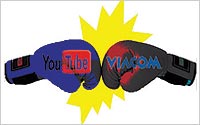YouTube Wins Copyright Battle With Viacom
- by Wendy Davis @wendyndavis, April 18, 2013
 A federal judge has cleared YouTube of liability for infringing copyright by allegedly hosting tens of thousands of clips of content owned by
Viacom.
A federal judge has cleared YouTube of liability for infringing copyright by allegedly hosting tens of thousands of clips of content owned by
Viacom.
In a decision issued on Thursday, U.S. District Court Judge Louis Stanton ruled that Google's YouTube was protected by the “safe harbor” provisions of the Digital Millennium Copyright Act, which broadly give sites immunity when users upload copyrighted material, as long as the sites remove the content upon request.
The ruling marks the second time that Stanton dismissed Viacom's case, which the company filed in 2007. Viacom appealed the prior dismissal to the 2nd Circuit, with partial success. Last year, the appellate court revived Viacom's lawsuit, ruling that the company should have a chance to present more evidence.
But that ruling was seen as mixed because the 2nd Circuit rejected Viacom's argument on a crucial issue -- whether Google could be liable simply because it knew of infringement in general on its site and didn't proactively take steps to prevent piracy. On that point, the court ruled that Google was eligible for the safe harbor, despite a “general” knowledge of infringement, as long as the company removed specific URLs upon request.
At the same time, the 2nd Circuit ruled that Viacom could prevail if it proved that Google was “willfully blind” toward infringement, or knew of specific instances of pirated clips and ignored them.
Stanton ruled on Thursday that Viacom hadn't presented enough evidence to show “willful blindness” on Google's part. A key piece of Viacom evidence was a March 2006 report prepared by YouTube founder Jawed Karim, which said that clips of "well-known shows," including "Family Guy," "South Park," and "MTV Cribs," were present on the site. But Stanton said Thursday that Karim's memo “does not tie his observations to any specific clips,” and therefore doesn't prove that YouTube was willfully blind.
Stanton also said in the 24-page decision that YouTube didn't encourage piracy by users.
“There is no evidence that YouTube induced its users to submit infringing videos, provided users with detailed instructions about what content to upload or edited their content, prescreened submissions for quality, steered users to infringing videos, or otherwise interacted with infringing users to a point where it might be said to have participated in their infringing activity.”
A Viacom spokesperson said the company intends to appeal the dismissal. “This ruling ignores the opinions of the higher courts and completely disregards the rights of creative artists,” he said.


